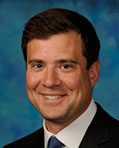Mobile health applications for mobile devices, from tablets to watches, are offering patients and physicians more accessible healthcare and new ways to manage billing and coding.
Here, six surgeons and healthcare professionals discuss whether they use mobile health applications, and which ones they prefer.
Ask Orthopedic Surgeons is a weekly series of questions posed to orthopedic surgeons around the country about clinical, business and policy issues affecting orthopedics. We invite all orthopedic surgeons and specialist responses.Next week's question: Do you incorporate music or music therapy into your practice, OR, or procedures?
Also, feel free to continue to send in responses to today's question.
Please send responses to Brandon Howard at bhoward@beckershealthcare.com by Wednesday, April 29, at 5 p.m. CST.
Question: Do you use mHealth applications, and if so which ones?

Christopher G. Fox, PhD, managing partner of Syncresis: Patients are likely downloading and using mobile health apps already. But risks are high. Their apps may not fit their therapeutic needs. A recent JAMA article questions the efficacy of many apps. Doctors and practices should strongly consider vetting and recommending apps to their patients if they want to stay ahead of the curve.
Kevin J. Biese MD, MAT, assistant professor of emergency  medicine and internal medicine and residency program director at the University of North Carolina School of Medicine in Chapel Hill: M-health helps integrate our healthcare system by making it easier for patients to get back in touch with the doctors and care providers that already know them.
medicine and internal medicine and residency program director at the University of North Carolina School of Medicine in Chapel Hill: M-health helps integrate our healthcare system by making it easier for patients to get back in touch with the doctors and care providers that already know them.
For example, I use TouchCare for my patients that aren't feeling well but don't need to be hospitalized or seen in-person the next day. It is really beneficial to be able to virtually see them over video consult as a follow up appointment… Using mHealth as a tool for the provision of quality care is going to be invaluable to providers as they deliver continuous, value based care. If we don't implement m-health, someone else will, and then our patients probably won't get the care they need
 Matthew Stiebel, MD, EMA orthopedics team lead of Modernizing Medicine:
Matthew Stiebel, MD, EMA orthopedics team lead of Modernizing Medicine:
Mobile technologies – especially those that are cloud-based – are becoming increasingly sophisticated and individually-focused for companies in the healthcare sector. There are many benefits to utilizing mobile tech, but perhaps the most significant is the ability to access patient data almost anywhere and at any time. Physicians are constantly on the go, trying to juggle our practices and our families, and mobile health technology helps us to provide the right care at the right time – and to streamline communications among colleagues and patients.
A cloud-based electronic medical record system such as EMA Orthopedics is built for exactly this purpose. Using a native iPad, iPhone or Android app, I have HIPAA-compliant access to patient information whether I'm at the office, in the hospital or at my kid's game. I can quickly and confidentially review the patient's chart and then address issues almost anywhere.
Additionally, during an appointment, desktop computers really put a distance between the patient and the physician, so using a touch-based iPad improves our communication. iPads also significantly decrease the time associated with data entry. Those of us who use iPad-based platforms designed for touch, not typing, can spend less time scribing notes, and more time focused on patient engagement. Another bonus to mobile health platforms is the ability to evaluate patient outcomes measurements when critically looking at our patient data.
EMA allows us to graphically track outcomes such as hip or knee scores over time in our patient population, and then to compare these outcomes to the rest of the community of EMA Orthopedics users via de-identified data. This allows us to really see "what's working" and "what needs to be changed" so we can truly deliver the best medicine to our patients as possible.
Telemedicine is another trend that is currently being used in the clinical environment; it gives patients and doctors access to specialists they otherwise might not have locally available. While it won't replace the need for all office visits, telemedicine can be used for some follow-up care by doctors and their physician extenders. I see an increased role in the future for this with postoperative patients and routine follow-ups. It's clear that the adoption of mobile health technologies will continue to grow as the industry evolves; but for now, it will continue to help physicians provide optimal care to their patients.

Samantha Traylor, DC, chiropractor and acupuncturist, Lumin SpineCARE, Irving, Texas: [I use] the mobile app ICD 9 to look up appropriate diagnosis codes. It's so much easier to use then 'Googling it' or looking it up in the book.
 Nere Onosode, DPM, foot and ankle specialist, Lumin OrthoCARE, Irving, Texas: I use the mobile app UpToDate for general and specific peer-reviewed articles and forinfo on medical topics. In addition, I use AbeoCoder for medical billing and coding, including ICD-9 and 10 and CPT codes. I also have a few mobile apps that I use for medication and RX info, including Epocrates and Omnio.
Nere Onosode, DPM, foot and ankle specialist, Lumin OrthoCARE, Irving, Texas: I use the mobile app UpToDate for general and specific peer-reviewed articles and forinfo on medical topics. In addition, I use AbeoCoder for medical billing and coding, including ICD-9 and 10 and CPT codes. I also have a few mobile apps that I use for medication and RX info, including Epocrates and Omnio.
 Afshin Arianjam, MD, orthopedic surgery sports medicine fellow, Kaiser Permanente, Orange County, Calif.: Doximity is a useful new tool that can help orthopedic surgeons connect with their colleagues to pass on information in a HIPAA-compliant way. Each account provides users with a free fax number and is able to access your faxes on your mobile device. Overall, a great tool!
Afshin Arianjam, MD, orthopedic surgery sports medicine fellow, Kaiser Permanente, Orange County, Calif.: Doximity is a useful new tool that can help orthopedic surgeons connect with their colleagues to pass on information in a HIPAA-compliant way. Each account provides users with a free fax number and is able to access your faxes on your mobile device. Overall, a great tool!


